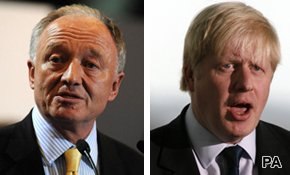Boris no longer the likely winner? YouGov President Peter Kellner explains our latest poll on the London mayoral race
Want to receive these commentaries by email? Subscribe here
The facts have changed, so I have changed my mind.
Throughout last year, I regarded Boris Johnson as the likeliest winner of London’s coming mayoral election. YouGov and other pollsters showed consistently that around one-in-five Labour supporters would desert Ken Livingstone and vote for Boris. From Labour’s viewpoint, London began to look alarmingly like Scotland, where Alex Salmond won his stunning victory last year because one in five normally Labour voters switched to the SNP.
Our latest poll tells a different story. We find a five-point swing from Boris to Ken. Last June, Boris enjoyed an eight-point lead (54-46%); now Ken is two points ahead, by 51-49%. Allowing for sampling error, the race is too close to call.
What explains the change? Not enthusiasm for Labour. When we asked people in the same polls how they would vote in a General Election, we find that Labour’s lead over the Tories has slipped from 19 points last June (51-32%) to 15 (49-34%). It’s about attitudes to Ken and Boris.
Our poll suggests two factors have been at work: one has dented Boris’s appeal, while the other has burnished Ken’s.
Boris’s new year problem is that he is seen as increasingly out of touch. As in our poll last June, we listed eight characteristics and asked people to say which applied to the two candidates. As a rule of thumb, with this kind of question – where we ask people to pick from a list rather than judge each characteristic separately – anything over 30 is a good score, and anything under 15 a bad score.
The proportion saying Boris is ‘in touch with the concerns of ordinary people’ has tumbled since June from 20% to 13%. A bearable score has become a terrible one. Meanwhile Ken, who was already ahead with 37%, has seen his ‘in touch’ score climb to 40%. He was in front; he is now out of sight.
Boris still trounces Ken as charismatic; but there is no other attribute that Londoners say one of the two men has, and the other lacks.
As for Ken, it looks as his promise to cut fares on buses and the tube has made an impact. Among all Londoners, transport vies with crime as their top concern. But among Ken’s supporters, transport is clearly ahead.
The upshot of all this is a collapse in the ‘Boris Labour’ vote. Last June, when we looked at people who took sides when given a straight choice between the two men, Labour voters divided: Ken 77%, Boris 23%. Our latest figures are: Ken 88%, Boris 12%. If we assume the same turnout last time, this amounts to 100,000 Labour voters switching back from Boris to Ken.
That said, it remains a significant achievement for Boris that he is still in the race. London is a Labour city. In the 2010 election, when Labour was trounced nationally, it still outpolled the Tories in London. It now enjoys a 15% lead. If everyone voted for mayor in line with their normal party preferences, Ken would be way out in front.
The best way to assess the impact of the two candidates is to compare their support in the first mayoral vote, when the Liberal Democrats’ Brian Paddick and other candidates are included, with their party’s support when the same people are asked how they would vote in a General Election.
These are the figures:
| June 2011% | Jan 2012% | |
|---|---|---|
Labour vote share | 51 | 49 |
First-round Livingstone support | 41 | 46 |
‘Ken effect’ | Minus 10 | Minus 3 |
| June 2011% | Jan 2012% | |
|---|---|---|
Conservative vote share | 32 | 34 |
First-round Johnson support | 48 | 44 |
'Boris effect' | Plus 16 | Plus 10 |
As those figures show, The Boris effect remains positive, while the Ken effect remains negative. But both effects are notably smaller than they were last June, which is why the next 15 weeks until polling day look like providing us with a closer race than seemed likely a few months ago.
See the survey details and full results of our latest London mayoral poll here
Want to receive these commentaries by email? Subscribe here
For more information on these results please contact our Director of Social and Political Research on joe.twyman@yougov.com, @Joetwyman, or call YouGov on 020 7012 6000










